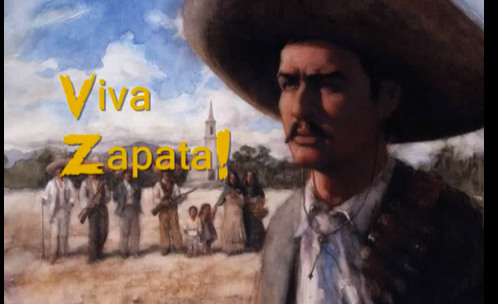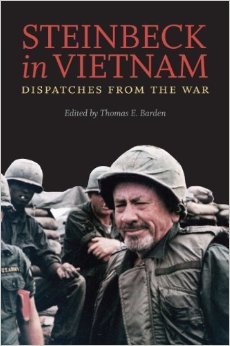John Steinbeck’s Zapata As Far Right Hero
 World War II had recently ended and the Korean War was well underway in 1952 when John Steinbeck’s Viva Zapata hit the big screen, starring Anthony Quinn and Marlon Brando. That same year Steinbeck began working for the Central Intelligence Agency. Like George Orwell, he was becoming acutely aware that big governments inevitably solidify into oppressive regimes.
World War II had recently ended and the Korean War was well underway in 1952 when John Steinbeck’s Viva Zapata hit the big screen, starring Anthony Quinn and Marlon Brando. That same year Steinbeck began working for the Central Intelligence Agency. Like George Orwell, he was becoming acutely aware that big governments inevitably solidify into oppressive regimes.
Set in the Mexican Revolution, Viva Zapata provides Steinbeck with a venue for exploring the necessity of armed revolution if people are to be free. Peasant-turned-general Zapata tells the local community in hometown Morales to always be vigilant–and ready to fight for freedom. When his brother becomes a self-serving oppressor, Zapata tells the locals that they must rely upon themselves:
This land is yours, but you must protect it. It won’t be yours long unless you protect it, if necessary, with your lives and your children with their lives. Don’t discount your enemies; they will be back. And if your house is burned, build it again; if the corn is destroyed, re-plant. If your children die, bear more. If they drive you out of the valley, live on the sides of the mountain. But LIVE. You’ve always looked for leaders, strong men without faults. There aren’t any. They’re only men like yourselves. They change. They desert. They die. There are no leaders but yourselves. A strong people is the only lasting strength.
Steinbeck trusted the instincts behind the American Revolution and grassroots political activism such as the Boston Tea Party. Like Orwell, he denounced Communist regimes and would not have liked the top-heavy “establishment” governments, now found in the socialistic West, as a later interview reveals:
The Communists of our day are about as revolutionary as the Daughters of the American Revolution. Having accomplished their coup and established their empire, revolution is their nightmare. They have to hunt down and eliminate everyone with the slightest revolutionary tendency, even those who help accomplish their own. Where they have absolute power they have  established the most reactionary governments in the world, governments so fearful of revolt that they must make every man an informer against his fellows, and layer their society with secret police.
established the most reactionary governments in the world, governments so fearful of revolt that they must make every man an informer against his fellows, and layer their society with secret police.
Worried about his soldier son’s safety while serving in Vietnam, Steinbeck became a reporter in that country in 1967, attempting to bolster support for the US Army even while the liberal news media back home were undermining the war. Steinbeck was attacked by left-leaning newspapers like the New York Post.
 established the most reactionary governments in the world, governments so fearful of revolt that they must make every man an informer against his fellows, and layer their society with secret police.
established the most reactionary governments in the world, governments so fearful of revolt that they must make every man an informer against his fellows, and layer their society with secret police.
Hey — a good blog about Steinbeck’s politics, which were never as left-wing as his ideological soul mates and enemies believed or desired. In the course of doing my crazy Amazon ebook, Dogging Steinbeck, which is both an expose of the fictions and lies Steinbeck put into “Travels With Charley” and a traditional American road book, I address some of these issues. Steinbeck was never a tool of the commies, especially when he was behind the Iron Curtain (where he was probably sleuthing for the CIA, and he had a decent libertarian streak. He was a Cold War liberal who liked guns, understood the value of property rights, encouraged dissident writers in the USSR and was an individualist — despite being too fond of FDR and his New Dealeries.